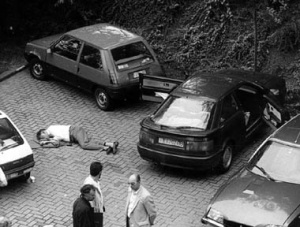Difference between revisions of "Brabant Massacres"
m (Text replacement - "|WP=https://" to "|wikipedia=https://") |
|||
| Line 5: | Line 5: | ||
|fatalities=28 | |fatalities=28 | ||
|injuries=40 | |injuries=40 | ||
| + | |start=13 March 1982 | ||
| + | |end=9 November 1985 | ||
| + | |perpetrators=Operation Gladio? | ||
|description=A set of murders between 1982 and 1985, in which 28 people died and 40 were injured. It became [[Belgium]]'s most notorious unpunished crime spree. | |description=A set of murders between 1982 and 1985, in which 28 people died and 40 were injured. It became [[Belgium]]'s most notorious unpunished crime spree. | ||
}} | }} | ||
Revision as of 17:50, 24 September 2016
 | |
| Date | 13 March 1982 - 9 November 1985 |
|---|---|
| Perpetrators | Operation Gladio? |
| Deaths | 28 |
| Injured (non-fatal) | 40 |
| Description | A set of murders between 1982 and 1985, in which 28 people died and 40 were injured. It became Belgium's most notorious unpunished crime spree. |
Contents
Belgian Gladio
Some have suggested that Operation Gladio was activated in Belgium, as in Italy, to try to subdue the popularity of communists. One difference was however that, in contrast to the various acts of terrorism in Italy, the Brabant Massacres were never explicitly blamed on communists.[citation needed]
Connections to SDRA8
The last attack when the gang struck despite patrols checking the supermarket every twenty minutes led to rumours of them having some kind of inside knowledge and possibly complicity by individual Gendarmerie in the attacks. Gendarmerie vehicles (which had an Uzi in a compartment) were present approximately 100 meters away, but failed to engage or pursue the attackers. The Belgian stay-behind network Gladio/SDRA8 — operating under the control of the Belgian General Information and Security Service was suggested by some to have links to the gang.
Francovich's Film
- Full article: Operation Gladio (film)
- Full article: Operation Gladio (film)
Allan Francovich's 1992 film on Operation Gladio looked at suggested the Brabant Massacres may have been connected to Westland New Post, a small private Belgian anti-communist organization whose leader Paul Latinus states that he was working with government agencies in a Gladio-like arrangement. In Francovich's interviews some WNP members (including some Gendarmerie) recall being ordered in the early eighties to covertly spy on and compile a report on the security arrangements at various Belgian supermarkets, including ones of a large chain that was the main target of the later killings. NATO behind-the-lines units are known to have used the planning of robberies as a theoretical exercise for training.[1][2][3][3] [4][5]
Michel Libert, the former no. 2 of Westland New Post has admitted that passing on orders to covertly assess supermarket security, though he has denied knowing anything more of the matter. Specifically, he insisted that Paul Latinus never told him of the purpose of these assignments.[2][3][3] [4][6][7][8] [8][9]
In 1983 Libert had been staying with Marcel Barbier, a WNP member, when he was arrested for using a weapon in a street fight and became suspected of a double murder at a synagogue a year earlier. When police then began investigating WNP, Latinus told them that Barbier and another WNP member were behind the synagogue murders, and that Latinus had helped Barbier getting rid of the murder weapon and other relevant evidence. Barbier was the only person convicted for these murders, his co-accused who was acquitted, but later convicted of a similar double murder of diamond merchants, appeared in a Belgian TV program in 2014, where he alleged WNP was behind the Brabant killings based on WNP apparently having compiled information on the premises raided. Libert was arrested as a suspect soon after the program was broadcast, but released without charge after 48 hours.[2][3][3] [4][6][7][8] [8][9]
Parliamentary inquiry denies connections
The Belgian parliamentary inquiry into Gladio suggested that they found no "substantive" evidence that Gladio had committed any acts of terrorism, or that criminal groups had infiltrated the stay-behind network.[10][11] The Belgian Gendarmerie were abolished in reforms that came as a result of a perceived lack of satisfactory performance in the case of the Brabant Massacres, and that of Marc Dutroux.[12]
Event
| Event | Description |
|---|---|
| Brabant Massacres | A set of murders between 1982 and 1985, in which 28 people died and 40 were injured. It became Belgium's most notorious unpunished crime spree. |
References
- ↑ Financial Times blog, May 10, 2013, Sir Ranulph Fiennes caught trying to rob a bank
- ↑ Jump up to: a b c Gazet Van Antwerpen/Belga (2014). "Ex-kopstuk Westland New Post vrijgelaten (Former leader Westland New Post released)".Page Module:Citation/CS1/styles.css must have content model "Sanitized CSS" for TemplateStyles (current model is "Scribunto").
- ↑ Jump up to: a b c d e f Résistances.be [1]
- ↑ Jump up to: a b c The Brussels Times, 23 October 2014, Brabant killers: Michel Libert (WNP) taken in for questioning from home in Brussels
- ↑ RTBF Tueries du Brabant: perquisition et interpellation de Michel Libert (WNP)
- ↑ Jump up to: a b Michel Libert interpellé le jour de la diffusion du Devoir d'Enquête " Spéciale TUERIES DU BRABANT "
- ↑ Jump up to: a b 3 octobre 2014 , Tueries du Brabant: pas d'inculpation de Michel Libert
- ↑ Jump up to: a b c d RTBF Tueries du Brabant: perquisition et interpellation de Michel Libert (WNP)
- ↑ Jump up to: a b Template:Nl icon Gazet Van Antwerpen/Belga (2014). "Gewezen lid extreemrechtse groepering ondervraagd over Bende van Nijvel (Former member extreme right group interrogated about Brabant Killers)".Page Module:Citation/CS1/styles.css must have content model "Sanitized CSS" for TemplateStyles (current model is "Scribunto").
- ↑ http://www.senate.be/lexdocs/S0523/S05231297.pdf
- ↑ Permanent Committee for the Control of Intelligence Agencies (Belgium) See in particular the "history" section in the "Presentation" part.
- ↑ Chronologie des faits attribués aux tueurs du Brabant page 21-22